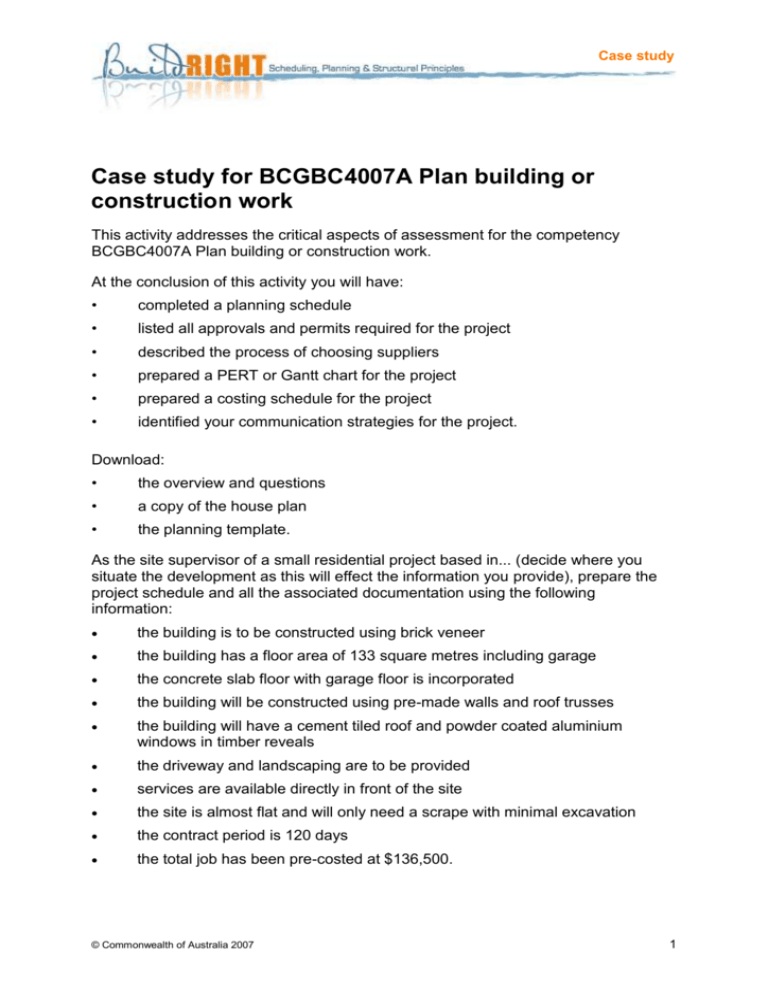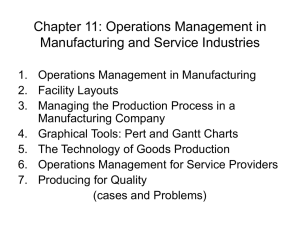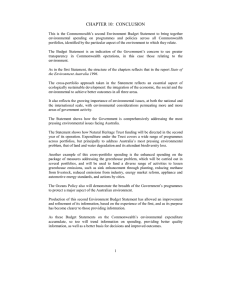Case Study BCGBC4007A – Plan building or construction work
advertisement

Case study Case study for BCGBC4007A Plan building or construction work This activity addresses the critical aspects of assessment for the competency BCGBC4007A Plan building or construction work. At the conclusion of this activity you will have: • completed a planning schedule • listed all approvals and permits required for the project • described the process of choosing suppliers • prepared a PERT or Gantt chart for the project • prepared a costing schedule for the project • identified your communication strategies for the project. Download: • the overview and questions • a copy of the house plan • the planning template. As the site supervisor of a small residential project based in... (decide where you situate the development as this will effect the information you provide), prepare the project schedule and all the associated documentation using the following information: the building is to be constructed using brick veneer the building has a floor area of 133 square metres including garage the concrete slab floor with garage floor is incorporated the building will be constructed using pre-made walls and roof trusses the building will have a cement tiled roof and powder coated aluminium windows in timber reveals the driveway and landscaping are to be provided services are available directly in front of the site the site is almost flat and will only need a scrape with minimal excavation the contract period is 120 days the total job has been pre-costed at $136,500. © Commonwealth of Australia 2007 1 Case study Note: In preparing your plan, allow for seasonal variations in the local weather conditions. For example in Victoria in the months of May to August, it would be advisable to add 1.5 days per month to allow for delays due to wet weather. Step 1 Identify the relevant approvals and planning permits that need to be sought and list those that will be required for the project. Step 2 Describe the process you will use to decide which suppliers to use for the materials and labour requirements of the project. Include the communication strategies you will use to prepare this information. Step 3 Prepare the schedule. Here are some suggestions to help you: Rule up the schedule vertically into four-week periods to give it a time scale. Assess (in days) how long each trade will take. Sequence the trades, checking the order that is suggested in the template. Build up the schedule by allocating appropriate times for each trade. Be generous with your time allowances initially, starting with weeks and later reducing these to part weeks or days. Remember to allow float time in the planning as not all trades will be available when you need them. Finally, try to plan your schedule to finish one or two weeks ahead of the completion date. Often you will need this time to finish off the project. Step 4 Determine the critical path of the project by using either a PERT chart or a Gantt chart. This may be done by hand or by using computer software. © Commonwealth of Australia 2007 2 Case study Step 5 Build the costs into the project schedule template. The total cost of the job has been supplied based on the estimating guides. You may find the following guidelines helpful: Use the nominal % provided in the column titled '% of project total' to enter the costs of all the trades in the '$ of project total' column. Calculate the costs for each trade or job. Allocate the costs proportionately across each of the jobs as the work progresses. Add up the costs for each month. This is done vertically in each period and totalled along the bottom of the schedule. Step 6 The cash flow chart for the project schedule totals the progressive payments monthly. Progressive payments are calculated using a standard method of payment. In Victoria these are generally: deposit 5% slab 10% frame 15% lock-up 35% fix 25% completion 10% Note: Documentation for payment schedule details are usually found in the contract. © Commonwealth of Australia 2007 3











